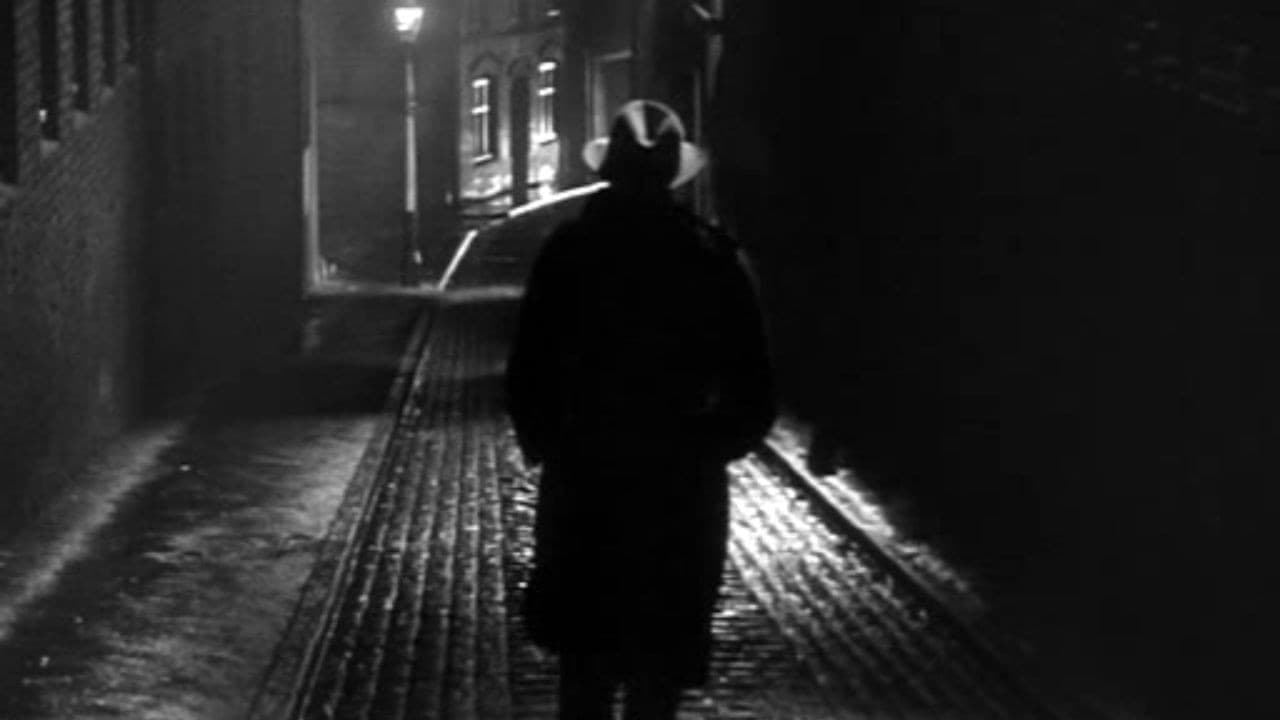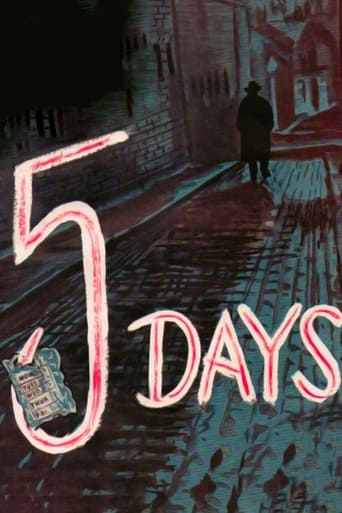

Purely Joyful Movie!
... View MoreMost undeservingly overhyped movie of all time??
... View MoreWhat a freaking movie. So many twists and turns. Absolutely intense from start to finish.
... View MoreThere is, somehow, an interesting story here, as well as some good acting. There are also some good scenes
... View MoreJames Neville (Dane Clark), the MD of Amalgamated Industries, is double crossed on a business deal by the archaeologist Cyrus McGowan (Howard Marion Crawford) leaving his firm on the brink of bankruptcy. He arranges to have himself killed so that his wife Andrea (Thea Gregory) can claim his substantial life insurance. He blackmails his friend Paul Kirby (Paul Carpenter) into committing the crime over a murder he undertook some years ago. Neville testified at his trial that it was self defence and was acquitted as a result, but the deceased's widow has since sent him some letters proving that it was actually murder one. Neville has put them into a sealed envelope with instructions that they are to be delivered to the police should he still be alive within forty eight hours. Naturally, he has arranged what should be a watertight alibi for his would be assassin. However, in a strange twist of fate, McGowan announces that their deal is back on and Neville is now faced with the dilemma of finding his killer before he can kill him. The trouble is, he has vanished. Aided by his loyal secretary, Joan Peterson (Cecile Chevreau), who is madly in love with him, he sets out to find Kirby. Several attempts are made on Neville's life before he visits his girlfriend at a Soho pub where she works and he learns that he has skipped the country as a result of getting cold feet over their contract. So who is using the contract for their own ends and who else could have known about it?...A British crime noir with a fanciful yet undeniably ingenious plot. On the downside, you will not have too much trouble in working out who Dane Clark's would be assassin is, but this is a very rewarding entertainment nonetheless. It quite convincingly recreates the style and atmosphere of American film noir thanks to the solid and sympathetic direction of Montgomery Tully, the excellent b/w camerawork of veteran Walter Harvey and strong performances from the leads - especially Dane Clark.* Caution - very large spoilers in the next paragraph.* He plays his part with a real depth of feeling alternating between ruthless brutality in the way he blackmails and bullies his friend into committing his own murder and his loving devotion towards his wife. Despite being a workaholic and letting his high powered job take him over, which means he seldom ever gets time to spend with her, he worships the ground she treads on and, so it seems, vice versa. She sticks with him through thick and thin and the reason Neville devised his elaborate plot was so that he could leave her well provided for and spare her the damage of the scandal and embarrassment that would have surely resulted had the company gone under as a result of him. When he finally finds out that his beloved wife has betrayed him and has a new lover in the form of one of his business partners Peter Glanville (Anthony Forwood) who both plot to kill him using his own contract he refuses to believe it. In the climatic shoot out in which Andrea is accidentally shot dead, he looks down at her and is deeply devastated. He gently picks up her body off of the floor and carries her back into the house saying "I mustn't leave her here, its dark, its not right" suggesting that he will still miss her and love her deeply in spite of everything. Cecile Chevreau is quite good as Joan, although her stern, bossy and schoolteachery character risks becoming off putting, and the look of envy and despair on her face as Neville picks up his wife's body and lovingly caressing it as he takes it indoors is priceless. Indeed, as the film ends we are invited to think that Joan probably did get her man, and that in the best film noir tradition, probably lived a disastrous relationship since she would have been overshadowed by Andrea even though she is dead. Room for a sequel? No, the fact that it is left for the audience to ponder the futures of the main protagonists is more fun and adds to the film's overall impact. Thea Gregory also offers a fine performance as Clark's wife and makes the perfect femme fatale.All in all, the film succeeds as an atmospheric and diverting triangle of love, deceit, treachery and murder that comes off a whole lot better than I was expecting it to. I am a follower of veteran British 'B' picture director Montgomery Tully's work and this, I think, stands as one of his better offerings. It makes us regret that after his 'A' film career faltered in the late forties that he would remain within the quota quickie industry for the remainder of his career. This is actually an early Hammer film (made in their Exclusive days) and, from the films from this era of their history that I have been able to see, it seemed they tried for quality even when making b-pics and more often than not got it.
... View MoreHammer Studios was Yet to Find its Niche and Managed to Make B-Films of Different American Genres in Their Pre-Horror Boom. The Studio's Late Entries Into the Noir Cycle were Not Bad but Still a Day Late and a Dollar Short.Even the American Born Genre of Film-Noir was Showing Signs of "Evolving" or "Devolving" into More Palatable Pictures in that More Optimistic and Eisenhower Friendly "Crime Dramas" and All but Abandoned the Cynicism and Dark Undertones of the Best of the Noris.Here there are a Couple of Scenes that Remind of What those Dark Films Offered, Like a Nightmre Alley with a Killer on the Loose and a Claustrophobic Greenhouse Finale that Highlight. Dane Clark does a Fine Job as a Fate Gone Wrong Businessman and Shows Some Range. The Supporting Cast Not So Much as Most of the Characters are Shallow and Purely Pedestrian.Worth a Watch for Hammer Completest and B-Movie Crime Fans, but by 1954 Film-Noir was Turning into Something Different and This One was Caught on the Edge of the Transition and While Nothing Special, it is One More that Can Be Put on that List of Film-Noirs that have Many Entries that Simply Seem to Fit Arguably and Not Comfortably.
... View MoreIrony meets Film Noir in this study of an anxious C.E.O. who, believing he is on the verge of financial ruin, plots his own murder so his philandering wife will get the insurance money. But as fate has it, his fortunes turn, and he must stop the hit-man he hired to kill him before it is too late. "One way or another, I'm gonna get ya!" could be the theme song of one sequence where the killer goes after him in a variety of ways, and after these several attempts fail, he learns the truth.An above average entry in this series of Hammer Film Noirs (many of them less than mediocre), it is a variation of the old "D.O.A. plot where the victim tries to solve his own (possible) demise. A faithful secretary is his only confidante, and there's always a doubt as to who the real culprit is. Dane Clark may seem an odd choice to play a corporate executive (especially one in England), but he's actually quite good. There's a very funny sequence involving a rare Aztec vase being protected by a nervous assistant to the over-the-top Sydney Greenstreet like archaeologist whose denouncement at the very beginning of the film sets Clark's plans into motion.
... View MoreI'd always been interested in catching some of the films from Hammer's pre-horror boom; so far, the only title I'd come across was PHANTOM SHIP (1935) which was made a couple of decades before the studio reached its peak period but which, presciently, starred one of the era's horror icons Bela Lugosi.Anyway, Hammer apparently made a whole slew of ultra low-budget noirs featuring either faded American stars or second-tier leading men. This one, then, happened to be shown on late-night Italian TV and, knowing it's been released on DVD by VCI, I made it a point to check it out. It turned out to be a decidedly modest but not unpleasing little film: the star in this case is Dane Clark (not exactly top rank, you see) and, as I lay watching, felt that he wasn't really noir material an opinion which, incidentally, I would change the very next day when I saw this same actor in the superior French-made GUNMAN IN THE STREETS (1950)! The plot, though far-fetched, is engaging: Clark's business fails and, in order to provide for his wife, proposes to have himself killed so that she can collect on his insurance; soon after, his fortune unexpectedly turns and he desperately seeks to stop his killer from carrying out the assigned task! Even if I watched the film dubbed in Italian, the London settings and character types offer a whole different atmosphere to the American noirs the same thing goes for the French locations of GUNMAN IN THE STREETS and this does help keep one's mind off the measly production values. The denouement provides a few surprises Clark's wife emerges a villainess (which allows him free rein with the devoted secretary who had really loved him all along), the attempts on his life turn out not to have been done by the person he paid expressly for that purpose which elevates the whole slightly than would otherwise have been the case. Besides, the film is short enough at 75 minutes not to overstay its welcome or allow the proceedings to slip into tedium. By the way, the original British title of this one is FIVE DAYS (the period of time over which events take place) but got changed to the more evocative PAID TO KILL for the U.S.
... View More